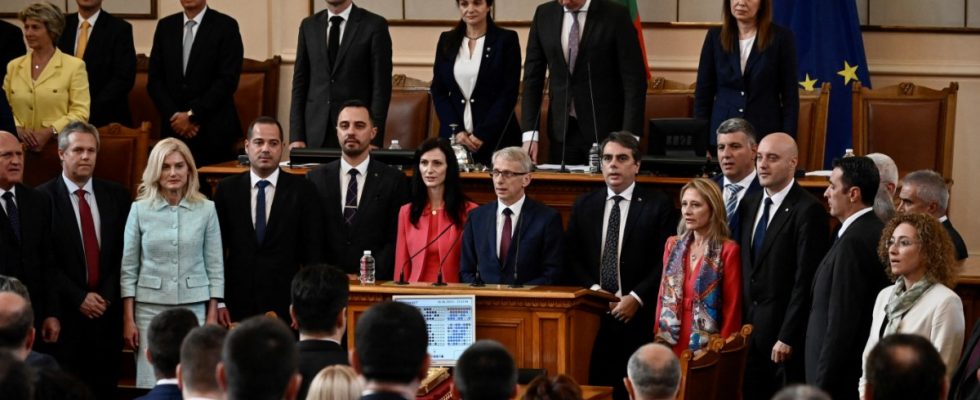In theory, conservative Foreign Minister Mariya Gabriel should have been sworn in as Prime Minister of Bulgaria these days; At least that was the plan. After five elections in two years, last June the two strongest parties in the Bulgarian parliament grudgingly agreed on a rotation principle in order to end the ongoing political crisis: for nine months, Nikolai Denkow from the Europe-friendly reform alliance “We are continuing the change” and “Democratic Bulgaria” (PP-DB) lead the government. Then Gabriel, who was unexpectedly brought back to Sofia from her post as EU Commissioner for Research, Culture and Youth last year, was supposed to take over for the Gerb party.
But there had been rumors in Sofia for months that the plan would probably fail because Gerb was already speculating on new elections. Denkow therefore reluctantly resigned at the beginning of March, but emphasized that PP-DB was sticking to its side of the deal. Now Bulgaria is actually facing early elections again, which, if President Rumen Radev plays along, should take place parallel to the European elections. Mariya Gabriel gave up her mandate a few days ago – officially on the grounds that no agreement on a cabinet was possible with her previous coalition partner.
The government crisis could now lead to a constitutional crisis
The two versions of the failure of the planned rotation, which was supposed to be repeated until the end of the legislative period, differ. Gerb says that DB-PP refused consultations and boycotted the formation of a new, joint cabinet.
DB-PP states that it was assumed that only the head of government would be replaced; Gerb not only insisted that Gabriel remain Foreign Minister in addition to the office of Prime Minister, but also presented a new cabinet list without prior consultation. Among other things, there was a new defense minister on it. The strong man behind Gabriel, the long-time head of government Boyko Borissov, didn’t even pick up the phone when Denkow called – and was obviously aiming for new elections.
The government crisis could now immediately lead to a constitutional crisis – at least that is how the President, who is supported by the Russia-friendly Social Democrats, sees it. After Gerb had given back the mandate for the new government after Denkow’s – agreed – resignation, Radev first gave the DB-PP and then the right-wing populist party of the pop star Slawi Trifonov the order to form a government; As expected, both were unable to organize a majority in parliament.
Now the president must temporarily appoint a government of experts
Now, as has been the case several times in recent years, when no coalition was formed due to equally strong but incompatible political blocs, the president must temporarily appoint an expert or caretake government. Until now, Radev had always been able to do this as he saw fit. But the outgoing government limited his power a few months ago with a constitutional amendment and specified a list of high-ranking positions from which the president can choose the head of such a government of experts.
These include the Speaker of Parliament, the Governor of the National Bank, the Government Ombudsman and the Head of the National Audit Office. But because the government’s ombudsman is slated for a post at the European Court of Human Rights and her deputy hastily resigned in the midst of the current crisis, Radev now complains that his options are severely limited.
However, behind the alleged dispute over the exchange of ministers and unanswered telephone conversations there are completely different lines of conflict. The rule of law coalition DB-PP, for example, which was formed only three years ago after months of mass protests against a corrupt government and a dysfunctional state, accused Gerb and her party leader Borissow of actually being afraid of the consequences of the reform policies initiated in recent months. “Were perhaps a functioning justice system, functioning control authorities and a reformed secret service the real problem?” asked party founder Kiril Petkow, who led the first government under DB-PP leadership two years ago, on the X platform. Borissov apparently had above all He was afraid that pending corruption proceedings against him would now be carried out more consistently.
Bulgaria had clearly sided with Kiev in the Russian war – until now
But even more important is the question of the direction of a future government – if one comes into being after the early elections in June. Until now, Bulgaria had clearly sided with Kiev in Russia’s war against Ukraine. But not only the recently strengthened, right-wing extremist and ultranationalist party “Rebirth” (Vashrashdane) as well as the Russia-friendly socialists are calling for a departure from this policy, while Russian propaganda media is still heating up the mood in the traditionally Russia-friendly country. An aid package including arms deliveries worth 140 million euros for Ukraine is now stuck in parliament.
But there are also some steps at stake that would have meant more EU integration. Bulgaria wanted to finally join the Eurozone after an initial postponement due to the ongoing political crisis, and full membership in the Schengen area is also up in the air.

